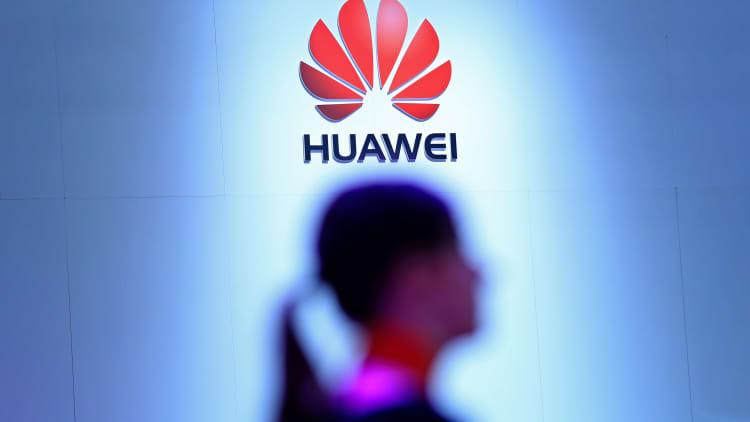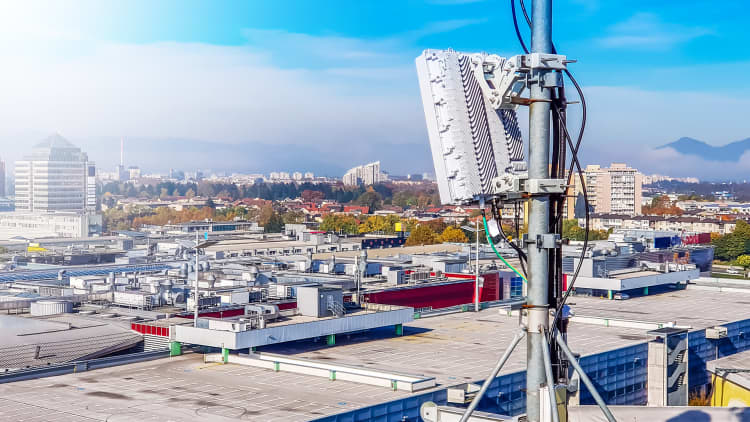You've probably heard "5G" a lot recently. It's been in a lot of stories.
It's at the center of America's fight with China's Huawei, which provides cellular equipment for wireless carriers around the globe.
5G is also a big topic for Verizon, Sprint, T-Mobile and AT&T. Those carriers are working to build out the faster networks now, and Sprint and T-Mobile have even used 5G to discuss the competitive landscape in an effort to get merger approval from the Justice Department.

Apple recently ended a bitter, yearslong legal battle with Qualcomm mainly because the chipmaker manufactures some core 5G technology that Apple needs to make future iPhones competitive.
But what the heck is 5G?
Put simply, 5G is a next-generation wireless network that will give you much faster internet connections. But, because of the way it works, it's about to change the way lots of other things connect to the internet, too, like cars and TVs, and even things like connected lights on city streets.
Here's what you need to know:
Faster connections, and more of them
5G promises much faster network speeds, which means heavy-duty content like video should travel much more quickly to connected devices.
Verizon's 5G network, which is live in Minneapolis and Chicago, is already providing speeds in excess of 1Gbps, or about 10 times the speeds you might get on a good day with 4G LTE, the current standard offered by wireless carriers in most places. That means you should be able to download an hourlong high-definition video in seconds instead of minutes.
The lower latency of 5G also means that it takes less time for one gadget to talk to another. This is important in places like smart cities that are connecting to smart cars, since information needs to be delivered instantly. One day, 5G might be able to tell your car that someone is about to run a red light and that your car needs to slam on the brakes. In that sort of situation, you can't have much delay in the network.
The greater bandwidth of 5G means that more devices can use the network at the same time. This means it should alleviate problems at places like sports stadiums or concerts where thousands of people may be trying to place a phone call or upload a picture at the same time. In these instances, a network can get jammed up and stops working for everyone. 5G should prevent that from happening.
5G will change the way you get TV and internet at home
Right now, you probably have a cable wire running from the telephone poles on your street to your house. It might come in the attic and then, thanks to some drilling done by the cable guy, snakes its way from room to room connecting to cable boxes. Those cables also need to connect to a modem and/or router to provide wireless internet to your house. That means even if you "cut the cord" and ditch cable, you still need the same coaxial cable line for internet at home.
4G LTE is fast but not quite fast enough for an entire house of people to play games and stream 4K movies at the same time. It makes a poor replacement for wired broadband.
According to proponents, 5G will be fast enough for that, and you can forget the cords. It's supposed to be just as reliable as the wired broadband internet you're used to, and it could save you a lot of headaches.
Verizon has already talked a bit about how this will work.
Instead of giving you a bunch of cable boxes and other gadgets, it's going to simply give you an Apple TV 4K and a wireless modem. Since Verizon isn't going to run a standard cable line to your house, it's also going to include a subscription to YouTube TV, YouTube's streaming service that will provide access to TV channels. YouTube TV normally costs $40 per month, but Verizon's deal is likely only a limited-time offer.
You'll still have a modem at home, but it'll connect to Verizon's wireless 5G signal and then serve as a home Wi-Fi router, complete with standard Ethernet ports. This is how devices like the Apple TV 4K, your smartphone, computer and other internet gadgets will connect to Verizon's 5G wireless network.
What phones support it?
It's still super early in 5G days for phones, but things are about to take off quickly.
Verizon and AT&T already have some 5G markets active, and Sprint and T-Mobile will begin rolling them out this year. Verizon is now selling the first 5G phone in the U.S. — the Samsung Galaxy S10 5G — in just two markets. Meanwhile, Sprint's LG V50 ThinQ 5G launches on May 31 for its first markets.
AT&T isn't selling a true 5G phone just yet, but it's signed up to sell the Samsung Galaxy S10 5G later this year, as are T-Mobile and Sprint.
These are all Android phones, but Apple is expected to have its first 5G iPhone ready in 2020.
How does 5G impact Sprint and T-Mobile's merger?
5G also plays a role in the proposed merger of T-Mobile and Sprint. Earlier this week, FCC Chairman Ajit Pai recommended that the FCC approve the $26.5 billion merger because he argues that it'll speed up how quickly the two carriers are able to activate 5G in the U.S.
"Two of the FCC's top priorities are closing the digital divide in rural America and advancing United States leadership in 5G, the next generation of wireless connectivity. The commitments made today by T-Mobile and Sprint would substantially advance each of these critical objectives," Pai said.
But the decision is up to the DOJ, which has antitrust concerns if the two companies join.
Trump says 5G is a race America must win
Even President Donald Trump is all in on 5G. In April, Trump said that 5G is a race that America "will win." He said 92 5G markets will be up and running by the end of the year, which will be ahead of South Korea, which is said to have 48 live at the same time.
"According to some estimates, the wireless industry plans to invest $275 billion in 5G networks, creating 3 million American jobs quickly, and adding $500 billion to our economy," Trump said in April. At the same time, the FCC announced new rules that will make it easier to deploy next-generation networks, including hub and relay antennas, to spur the advancement of 5G.
The FCC also announced a $20.4 billion Rural Digital Opportunity Fund to bring faster 5G networks to rural areas, and a new spectrum auction that opens up 3,400 MHz of wireless spectrum for carriers to bid on. The spectrum can be thought of as a highway: the more lanes you have, the more customers you can support and the faster you can go.
5G, Huawei and the U.S. trade war
5G has also played a role in the U.S. trade war with China, because of concerns that Huawei's equipment and phones can be used to spy over wireless networks.
Earlier this month, the Trump administration blacklisted Huawei's equipment for use in America's 5G rollout. Huawei wants U.S. business, however, and has argued that our 5G networks won't roll out quickly if we don't use its equipment.
Following the blacklist, Google cut ties with Huawei, though it has since granted a 90-day reprieve after the U.S. Commerce Department announced Monday that U.S. companies can work with Huawei for that window of time to make sure security risks are sealed up before Aug. 19. This will allow Google to help make sure people who own Huawei Android phones have the latest privacy patches installed on them.
The ban on working with Huawei also hit chip businesses that work with the company, including Broadcom, Intel, Xilinx and Qualcomm, some of which also have a hand in building out 5G networks and modems. Those companies will be missing out on new business as Huawei works to expand 5G networks outside of the U.S. If Google doesn't supply its version of Android to Huawei, it makes Huawei's phones a lot less appealing in the company's markets outside of China, like Europe, where it already sells highly competitive phones with full access to Google services like search and the Play Store. (Huawei can use a more basic version of Android, which is open-source and not controlled by Google and is already in use in China, but it won't have Google services included.)
Some analysts, including Evercore's C.J. Muse, think that Trump's ban on Huawei may have been a tactic to bring China back to the trade negotiations table. "The clear risk here is that while President Trump believes he has achieved leverage in the negotiations, we may have pushed China past the precipice and that the current technology cold war gets engrained and accelerates," Muse warned.
— CNBC's Yun Li and Arjun Kharpal contributed to this report.



